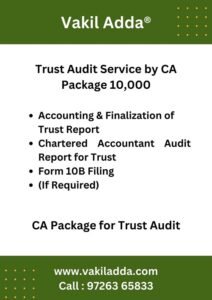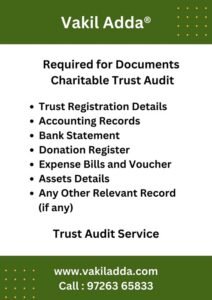Trust Audit Service by CA
Are you in need of Trust Audit service by CA? Look no further! Our team offers comprehensive solutions for Trust Audits, ensuring thorough examination and compliance with all necessary regulations. Whether you’re in any corner of India, we’re readily available to cater to your Trust Audit needs. Dive deeper into understanding Trust Audit procedures, including rules, requirements, documentation, processes, and fee structures. If you’re responsible for overseeing the financial affairs of a Charitable Trust and require the expertise of a trusted auditor, don’t hesitate to reach out to us today. Let us help you ensure transparency and accountability in your trust’s financial operations.
Searching for Trust Auditor (CA)?
Trust Audit Rules
When it comes to the audit of Charitable Trusts or NGOs, specific criteria outlined in the Income Tax Act govern the process. According to Section 12A(1)(b) of the Income Tax Act, certain key considerations must be taken into account. Firstly, an audit is mandated if the total income of the charitable organization for the relevant year exceeds the maximum amount not subject to income tax. However, exemptions apply if the organization’s total income falls below this threshold. Additionally, contributions or grants directed towards the organization’s corpus must be included when calculating the ceiling limit of the non-taxable amount.
Trust audits by Chartered Accountants play a crucial role in ensuring compliance with these regulations. Charitable Trust audit by a CA involves thorough examination and verification of financial records to ensure adherence to legal requirements. The accountant’s primary responsibility is to conduct the audit in accordance with Section 12A, though they are not obligated to validate compliance under other laws unless specified.
Furthermore, in addition to the conditions outlined in Section 12A(1)(b), there are other essential requirements to consider. Section 12A(1)(a) deals with registration requirements, necessitating trust registration applications in Form No.10A, as per Rule 17A. Ensuring compliance with these regulations through meticulous audits is vital for Charitable Trusts and NGOs to maintain transparency and accountability in their operations. Trust audits by experienced Chartered Accountants ensure that organizations meet their legal obligations while fulfilling their philanthropic missions. File your Income Tax Form 10B by CA, Connect Vakil Adda Team now for Trust Audit service by CA.
Applicability and Criteria of Trust Audit
Audit of Charitable Trust or NGO under the Income Tax Act
Audit Threshold:
- Mandated when the total income of the charitable organization surpasses the maximum amount not subject to income tax for the relevant year.
Audit Exemption:
- Not required if the organization’s total income, before considering the provisions of the Act, remains below the maximum exempt amount specified.
Submission of Trust Audit Report to Charity Commissioner
Submission of the Charitable Trust Audit Report to the Charity Commissioner is a mandatory requirement, with each report due annually for every financial year. This process ensures transparency and accountability within the charitable sector. Failure to comply with this obligation can have severe consequences, potentially resulting in the removal of the trust from the Commissioner’s register. Such removal not only jeopardizes the trust’s legal standing but also undermines its credibility and ability to operate effectively within the regulatory framework. Therefore, it is imperative for charitable trusts to prioritize the timely submission of their audit reports to maintain compliance and uphold their responsibilities towards stakeholders and beneficiaries.
Process of Trust Auditing by CA
You need to send us document for trust audit.
Our CA will conduct audit based on documents.
After that, we will file Audit report to relevant Authority, Including Form 10B Submission.
Types of Trust and CA Audit for Trust
When it comes to trusts, there are various types, each serving different purposes and structures. Similarly, the audit process for these trusts may vary depending on their nature and legal requirements. Below are some common types of trusts and their associated audit considerations:
Public Charitable Trusts:
- These trusts operate for charitable purposes, such as education, healthcare, poverty alleviation, etc., and are often established for the benefit of the public.
- Audit considerations: Public charitable trusts are typically subject to stringent regulatory oversight, requiring thorough financial audits to ensure compliance with legal and regulatory requirements. Auditors assess the trust’s financial statements, fund utilization, and adherence to applicable laws and accounting standards.
Private Trusts:
- Private trusts are established for the benefit of specific individuals or families, rather than the general public.
- Audit considerations: While the audit requirements for private trusts may be less rigorous compared to public charitable trusts, they still entail a thorough examination of financial records to safeguard the interests of beneficiaries. Auditors verify the trust’s financial transactions, asset management, and adherence to trust deed provisions.
Religious Trusts:
- These trusts are established to manage religious institutions, properties, or endowments and promote religious activities and welfare.
- Audit considerations: Religious trusts may be subject to specific legal and regulatory frameworks governing religious institutions. Auditors evaluate the trust’s financial operations, compliance with religious laws and regulations, and proper utilization of funds for religious purposes.
Educational Trusts:
- Educational trusts are formed to support educational institutions, scholarships, research, and related activities.
- Audit considerations: Auditors focus on ensuring the proper allocation of funds for educational purposes, compliance with educational laws and regulations, and the financial sustainability of educational initiatives. They also assess the quality of educational programs and outcomes funded by the trust.
Endowment Trusts:
- Endowment trusts receive donations and contributions to create a permanent fund, the income of which is used to support charitable causes or specific purposes.
- Audit considerations: Auditors scrutinize the investment management practices of endowment trusts to ensure prudent financial stewardship and sustainable growth of the endowment fund. They also assess the disbursement of income in accordance with the trust’s objectives and donor restrictions.
In summary, the audit process for different types of trusts varies based on their objectives, beneficiaries, and legal requirements. Whether it’s a public charitable trust, private trust, religious trust, educational trust, or endowment trust, conducting regular Trust Audit service by CA is essential to maintain transparency, accountability, and compliance with applicable laws and regulations.
Trust Audit Consultant Near You
Consultant Name : Vakil Adda
Serving Locations: Across India, All Cities States
Consultant Contact No.: 9726365833
Email: office@vakiladda.com
Services: Trust Audit Consultant | Trust Audit Consolidated Package


